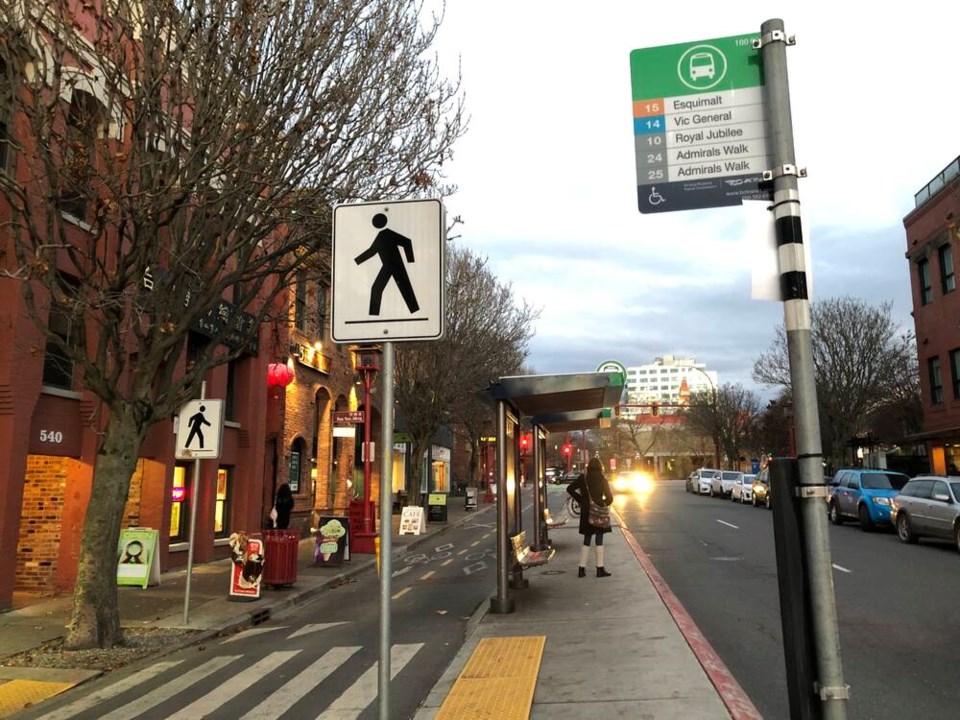A commentary by the author of the award-winning book The Politics of Blindness.
Blind people such as myself often ponder, when opening the front door to venture out, who, where or when the next violation of our dignity and rights will occur.
What new barrier will be confronted, what new villainous treatment, trickery, unlawful act or unnecessary danger will present itself? All because restorative justice is just a pretext.
In the latest violation, the City of Victoria, despite advice from advisory groups, chose to ignore dependent blind transit users.
The construction of “floating bus stops,” away from the curb alongside bike lanes on Pandora Avenue and Wharf Street, were rushed into service.
Three years ago, the Canadian Federation of the Blind filed a case of discrimination, which the city tried to dismiss. After a protracted first portion of the case, the B.C. Human Rights Tribunal confirmed the city discriminated against blind people.
The sighted presiding judge, however, mistakenly accepted an audible flashing light as a “reasonable accommodation.”
The bike lane barrier is the discrimination that the tribunal described as “daunting” to step into and a simple flashing light fails to remove that danger.
For the City of Victoria to fundamentally choose to alter traditional curbside bus stop locations, despite opposing advice, is an intentional attack on the liberty and integrity of a vulnerable minority causing the destruction of their safety and independence.
A blind pedestrian can locate a bus stop in its normal place at the curbside.
Isolating a bus stop on an island away from the sidewalk, without their knowledge, amounts to a discriminatory act, never mind adding a bike lane barrier.
Would you hide a ramp or elevator from a wheelchair user?
Forcing transit-dependent blind pedestrians to try to figure out where to navigate across a double bike lane with speeding, silent cyclists presents an unnecessary and dangerous physical barrier.
Incredibly, while awaiting the court hearing, the city arbitrarily modified, but did not remove, the barrier to access the stops.
The idea that the addition of an “audible” flashing light informs anyone of the location, speed or number of passing cyclists is preposterous.
This ineffective modification is analogous to adding a bannister or handrail to a flight of stairs to assist the wheelchair user.
It is not the blind citizen’s duty to constantly police every alteration that continues to add insult to injury. In fact, this irresponsible tactic belittles the blind complainants and jeopardizes the human rights process.
Expecting blind citizens to repeatedly chase the justice “can” when the city kicks it down the road makes a mockery of the legal process.
Now, it’s just astounding that the city is claiming blind people are attempting to re-argue the case when, in reality, the city surreptitiously carried out the ineffective modification without consultation with the very people involved.
Both sides should have a moral obligation to respect due process. Discrimination draws little condemnation from the judiciary and the Human Rights Tribunal as the last rung of the social ladder attracts little importance.
Powerful sighted officials presumptively believe they understand the concept of a barrier for a blind person. This arrogance is disingenuous — minimizing the act, excusing many discriminators, leaving the victim subjected to repeated persecution.
Such prejudice is either an inability to comprehend or, more likely, an innate preference to normalize discrimination.
The tribunal’s undisclosed settlements and published decisions to produce case law, including this latest disaster, are a recorded testament to the tribunal’s failure to stop increasing acts of hatred.
Emancipation of blind Canadians continues to be opposed by powerful civil servants.
Normalizing discrimination breeds anapirophobic or ableistic behaviour and is reminiscent of past abuse of blind people. Now, violations are subtle, deeply engrained and reflect an underlying culture of malice undeserving of a modern democratic society.
Blind people across this country, in the U.S. and overseas are watching this fiasco unfold before their very eyes.
- - -
To comment on this article, email a letter to the editor: [email protected]



